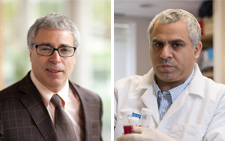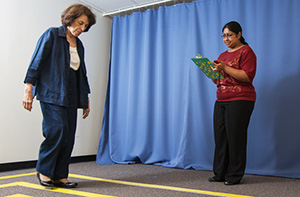

Genetics of Frailty
Einstein Study on Genetics of Frailty Aims to Keep Seniors Sprightly
Imagine starting to walk across a busy intersection. You have the light but traffic is turning into you from two directions. You must cross the street before the light changes while avoiding the turning cars. Then consider doing this when you're old and frail: You're walking half as fast and lack the agility for dodging cars. It's easy to see how the slow, shuffling gait of old age can be dangerous for a senior, even if he or she doesn't fall and break a hip.

Joe Verghese, M.B.B.S. Roee Holtzer, Ph.D."Frail elders are vulnerable to infections, falls and disability, and they often die sooner than they otherwise might have," said Dr. Roee Holtzer, associate professor in the Saul R. Korey Department of Neurology.
Dr. Holtzer is studying the genetics of frailty, with the goal of identifying interventions to keep people strong and agile as they reach advanced ages. He has teamed with Dr. Nir Barzilai, director of Einstein's Institute for Aging Research, Dr. Joe Verghese, professor of neurology and of medicine, as well as chief of Einstein's integrated divisions of cognitive & motor aging and of the division of geriatrics at Montefiore Medical Center, and Dr. Gil Atzmon, associate professor of medicine (endocrinology). Their new project is called the Central Control of Mobility in Aging (CCMA) study.
It's The Life in Your Years That Counts
The United Nations recently predicted that the number of centenarians will balloon worldwide from approximately 343,000 in 2012 to 3.2 million in 2050 — a 10-fold increase. But living longer all too often means becoming frail and having all the characteristics that frailty implies, including impaired mobility and a slower gait.

Nir Barzilai, M.D. Gil Atzmon, Ph.D.Dr. Barzilai's Longevity Genes Project, studies the families of 540 Ashkenazi Jews who have lived into their mid-90s and beyond. The long-term project looks for genetic markers associated with both long life and good health. The new CCMA, led by Drs. Holtzer, Verghese and Atzmon, is an outgrowth of the Longevity Genes Project in which Einstein researchers will look for longevity gene markers that may also protect against frailty.
"We assess declining gait speed in the CCMA study because it is a primary marker for determining mobility decline and frailty. And since a decline in gait speed is a core clinical feature of frailty, the two may share risk factors," said Dr. Holtzer, who is the study's principal investigator.
"Some physical traits, such as being tall and having big feet, are correlated," added Dr. Atzmon, who is the geneticist for the CCMA study. "So you would expect a gene that affects gait speed might also affect frailty."
The researchers may also seek other genetic variations that are relevant to frailty. "I expect that genes associated with bone density, muscle strength and maintenance of skeletal muscle will also be associated with gait speed, either individually or in combination," said Dr. Atzmon, whose expertise includes the interaction between a person's genetic "blueprint" and environmental factors that affect aging, longevity and risk of developing chronic disease.
Since frailty has an adverse impact on both quality of life and longevity, the goals of the CCMA study are to pinpoint diagnostic tests that can help identify biological and genetic markers associated with reduced risk of frailty that will point the way to new medications or other interventions.

In addition to gait, balance and coordination also are measured
Walking is No Cakewalk
Two "longevity genes" identified by Drs. Barzilai and Atzmon through the Longevity Genes Project are Apolipoprotein E (ApoE) and Cholesteryl Ester Transfer Protein (CETP). Certain variations of ApoE and CETP genes were associated with lower risks of cardiovascular disease and dementia among the project's participants, who ranged in age from 95 to 112 years, were healthy and living independently. (Dr. Barzilai refers to these individuals as "Super Agers.") Since cardiovascular disease and dementia can affect walking, the researchers are looking for the presence of these two genes, among others, along with measures of CCMA participants' cognition, coordination, balance and gait.
"Walking is a complex activity that occupies more brain power than you realize," explained Dr. Verghese. "Cognitive and attention deficits associated with dementia increase the risk of mobility issues and falling. And cardiovascular disease reduces blood supply to muscles and nerves, which can impair muscle strength and mobility."
"Longevity researchers agree that you can get to 100 several different ways," said Dr. Atzmon. Einstein's Super Agers are proof of that. Some reached the centenary milestone without developing the big four diseases — cardiovascular disease, cancer, diabetes and severe dementia — while others were resilient enough to overcome their symptoms and continue celebrating birthdays for another three or four decades. Either way, we expect that the CCMA participants who still have a spring in their step at age 70 or 80 should live longer than average, noted Dr. Atzmon.
Posted on: Friday, March 8, 2013


